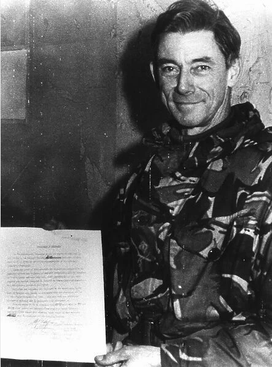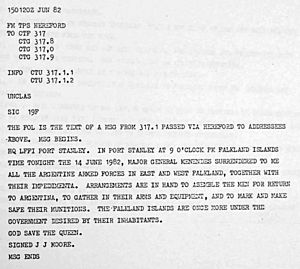Jeremy Moore facts for kids
Quick facts for kids
Sir
Jeremy Moore
|
|
|---|---|

Moore holding up the Argentine surrender document in 1982.
|
|
| Born | 5 July 1928 |
| Died | 15 September 2007 (aged 79) |
| Allegiance | United Kingdom |
| Service/ |
Royal Marines |
| Years of service | 1947–1983 |
| Rank | Major General |
| Commands held | 3 Commando Brigade Royal Marines School of Music 42 Commando |
| Battles/wars | Malayan Emergency Turkish invasion of Cyprus Indonesia–Malaysia confrontation Operation Banner Falklands War |
| Awards | Knight Commander of the Order of the Bath Officer of the Order of the British Empire Military Cross & Bar |
Sir John Jeremy Moore (born 5 July 1928 – died 15 September 2007) was a very important British officer. He was part of the Royal Marines. He is best known for leading the British land forces during the Falklands War in 1982. He was the one who officially accepted the surrender of the Argentine forces on the islands.
Contents
A Military Family
Jeremy Moore came from a family with a long history in the military. His father and his grandfather both served in the army. They even received a special award called the Military Cross during the First World War. His other grandfather was also a military commander.
Early Life and Training
Moore went to school at Brambletye School and Cheltenham College. He wanted to join the navy's air force at first. But he decided to join the Royal Marines in 1947 instead. He loved being a Royal Marine so much that he stayed for 36 years!
After his basic training, he served on a ship called HMS Sirius. In 1950, he joined a special unit called X Troop in Malaya. This was during a time of conflict known as the Malayan Emergency. In 1952, he earned his first Military Cross. This was for his bravery in a tough fight against rebels in the Malayan jungle.
Later, from 1963 to 1964, Moore studied at the Australian Army Staff College. He then served in Borneo in 1965, where he helped fight against rebels from Indonesia.
Leading the Way
Moore held many different roles during his career. He worked as an instructor and helped train other soldiers. He also served with 45 Commando in Cyprus, where they dealt with local unrest.
In 1962, he earned another award, a Bar to his Military Cross. This was for leading an attack in Borneo. His team rescued British and Australian hostages from rebels in a town called Limbang. A Royal Navy officer named Jeremy Black helped them cross a river. Years later, Jeremy Black would command a ship called HMS Invincible in the Falklands War.
Moore later became the commander of 42 Commando in 1971. He served two tours of duty in Northern Ireland. He even took part in a big operation called Operation Motorman. This operation helped the army and police enter areas that a rebel group had declared "no-go zones." For his excellent service, he received the Officer of the Order of the British Empire award in 1973.
Moore continued to rise through the ranks. He commanded 3 Commando Brigade from 1977. In 1979, he was promoted to Major General. This meant he was in charge of all Royal Marine commando forces.
The Falklands War
In 1982, Jeremy Moore was about to retire. But then, Argentina invaded the Falkland Islands. This changed everything. Moore quickly joined the team planning the British response. He then flew south to take command of all the land forces.
Moore arrived on the islands on 30 May. He took over from Brigadier Julian Thompson. Moore then put into action the plans that had been made. British soldiers had to march long distances across the islands. This was because there were not enough helicopters. They also faced strong resistance from the Argentine forces.
On 15 June 1982, Major General Moore accepted the surrender of the Argentine commander. This happened in Port Stanley, the capital of the Falkland Islands. This moment marked the end of the Falklands War.
After the war, Moore was given another high honor. He was made a Knight Commander of the Order of the Bath in October 1982. He left the Royal Marines in 1983.
Later Life
In his later years, Jeremy Moore helped raise money for research into liver diseases. He had a liver transplant himself. From 1990 to 1993, he was the Colonel Commandant of the Royal Marines. This was a special honorary role.
In 2007, he took part in a parade to celebrate 25 years since the Falklands War. Jeremy Moore passed away on 15 September 2007, at the age of 79. He is remembered as a brave and important leader in British military history.
Family
Jeremy Moore married his wife, Veryan, in 1966. They had two daughters and one son.
 | Georgia Louise Harris Brown |
 | Julian Abele |
 | Norma Merrick Sklarek |
 | William Sidney Pittman |


